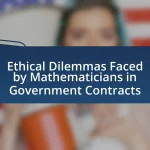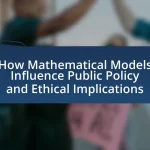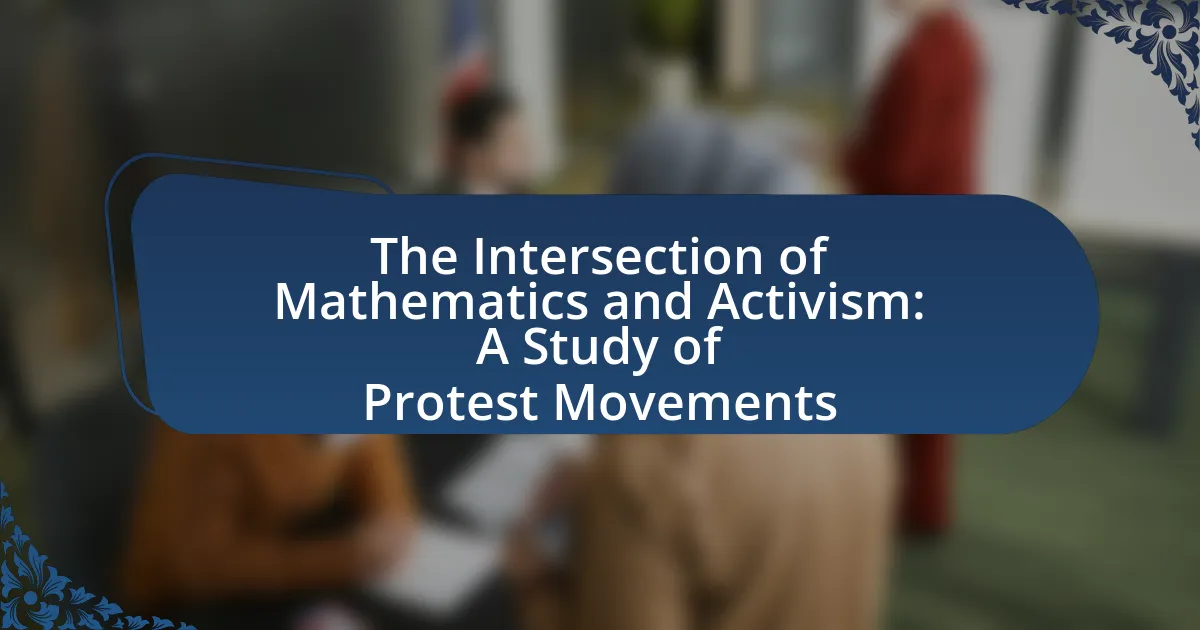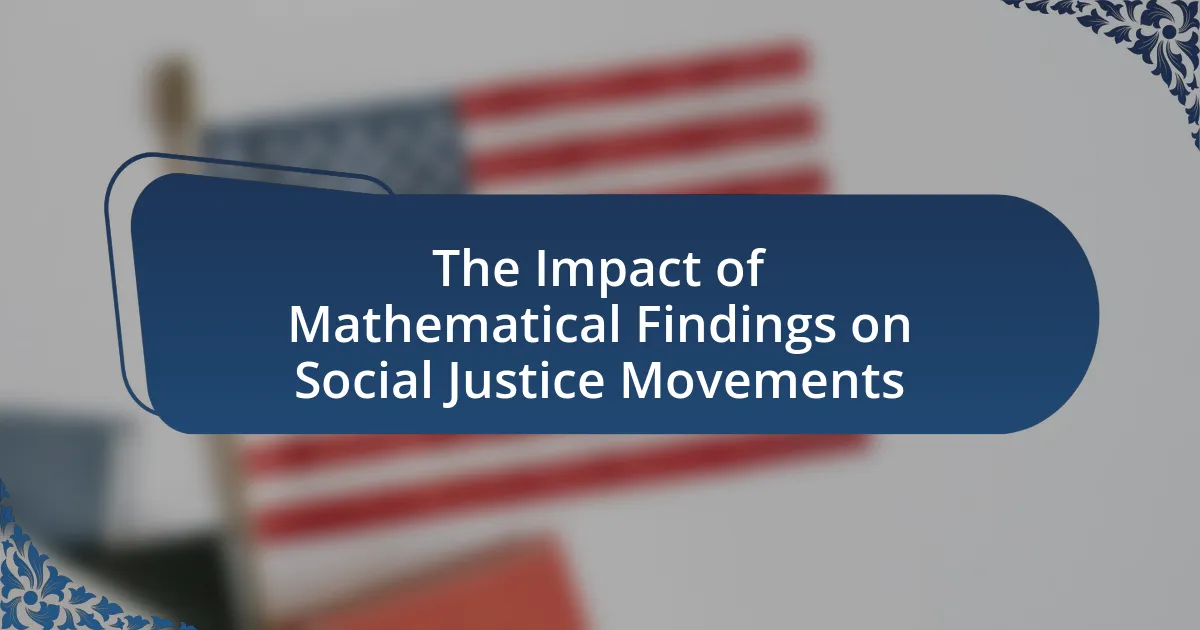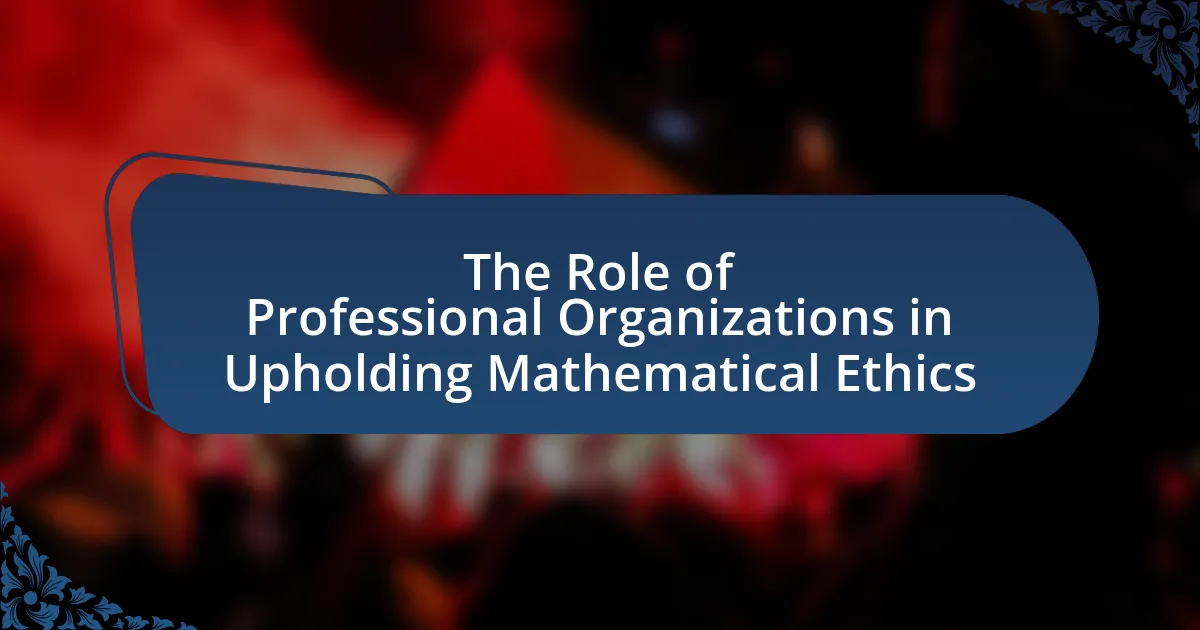The article examines the historical perspectives on mathematicians’ protests against unethical practices, highlighting significant movements and key events that shaped the discourse on ethics within the field. It discusses notable protests, such as those against the Nazi regime in the 1930s, military applications of mathematics in the 1960s, and the ethical implications of mathematical models in finance and policing. The article also explores how these protests have influenced current ethical standards, the role of professional organizations in promoting integrity, and the connection between mathematicians’ activism and broader social justice movements. Through this analysis, the article underscores the importance of ethical accountability and the ongoing responsibility of mathematicians to address societal issues through their work.

What are the Historical Perspectives on Mathematicians’ Protests Against Unethical Practices?
Historically, mathematicians have protested against unethical practices primarily through organized movements and public statements. For instance, during the 1930s, mathematicians in Germany opposed the Nazi regime’s policies that excluded Jewish scholars from academia, leading to significant international protests and the eventual establishment of the Mathematical Association of America to support ethical standards in mathematics. Additionally, in the 1960s, mathematicians like Paul Erdős and others protested against the use of mathematical research for military applications, advocating for the responsible use of mathematics in society. These protests highlight a long-standing tradition within the mathematical community to uphold ethical standards and challenge practices deemed unethical, reflecting a commitment to integrity in the discipline.
How have mathematicians historically responded to unethical practices in their field?
Mathematicians have historically responded to unethical practices in their field through various forms of protest, advocacy, and the establishment of ethical guidelines. For instance, during the 1930s, mathematicians like John von Neumann and others opposed the misuse of mathematics in military applications, advocating for responsible use of their work. Additionally, the establishment of organizations such as the American Mathematical Society has led to the creation of ethical standards and codes of conduct, which address issues like plagiarism and data fabrication. These responses demonstrate a commitment to integrity and accountability within the mathematical community, reflecting a broader awareness of the social implications of mathematical research.
What specific unethical practices have prompted protests from mathematicians?
Mathematicians have protested against several specific unethical practices, including the misuse of mathematical research for military applications, particularly in the development of nuclear weapons, and the exploitation of mathematical models to justify discriminatory policies. For instance, the involvement of mathematicians in the Manhattan Project raised ethical concerns about the application of their work in warfare. Additionally, the use of algorithms in areas like policing and finance has led to protests due to their potential to perpetuate systemic biases and inequalities. These instances highlight the ongoing ethical dilemmas faced by mathematicians regarding the societal implications of their work.
How have the motivations for protests evolved over time?
The motivations for protests have evolved from primarily addressing immediate social injustices to encompassing broader systemic issues and ethical concerns. Initially, protests were often sparked by specific grievances, such as civil rights violations or labor disputes, as seen in the civil rights movement of the 1960s, which aimed to end racial segregation and discrimination. Over time, these motivations expanded to include a wider range of issues, such as environmental justice, economic inequality, and ethical practices within professions, including mathematics. For instance, mathematicians have increasingly protested against unethical practices in research and academia, highlighting issues like data manipulation and the misuse of mathematical models in policy-making. This shift reflects a growing awareness of the interconnectedness of various societal issues and the role of professionals in advocating for ethical standards.
Why is it important to study the protests of mathematicians?
Studying the protests of mathematicians is important because it reveals the ethical standards and social responsibilities within the field of mathematics. These protests often highlight issues such as academic freedom, the misuse of mathematical research for harmful purposes, and the need for integrity in scientific practices. For instance, the 1970s protests against the use of mathematical models in warfare demonstrate how mathematicians sought to distance their work from unethical applications, emphasizing the role of mathematicians as advocates for ethical considerations in their discipline. Understanding these historical protests provides insight into the evolving relationship between mathematics and societal values, reinforcing the necessity for ethical accountability in scientific research.
What impact have these protests had on the field of mathematics?
Protests against unethical practices in mathematics have led to increased awareness and advocacy for ethical standards within the field. These movements have prompted mathematicians to critically examine their roles in society, influencing the development of ethical guidelines and professional conduct codes. For instance, the protests surrounding the use of mathematics in military applications have sparked debates about the moral implications of mathematical research, leading to a more conscientious approach among mathematicians regarding the societal impact of their work. This shift is evidenced by the establishment of organizations that promote ethical practices, such as the Mathematical Association of America, which emphasizes the importance of ethics in mathematical education and research.
How do these historical protests inform current ethical standards in mathematics?
Historical protests by mathematicians against unethical practices shape current ethical standards in mathematics by highlighting the importance of integrity, social responsibility, and the impact of mathematical work on society. For instance, the protests against the use of mathematics in military applications during the Vietnam War emphasized the need for ethical considerations in mathematical research and its applications. This historical context has led to the establishment of ethical guidelines and codes of conduct in professional organizations, such as the American Mathematical Society, which advocate for the responsible use of mathematics in addressing societal issues. These developments reflect a growing recognition of the mathematician’s role in promoting ethical practices and accountability in the field.

What are the Key Events in the History of Mathematicians’ Protests?
Key events in the history of mathematicians’ protests include the 1970s protests against the Vietnam War, where mathematicians like Philip Morrison and others opposed the use of mathematical research in military applications. Another significant event occurred in 1986 when mathematicians protested against the unethical practices of the apartheid regime in South Africa, leading to a boycott of South African mathematical institutions. In 2003, mathematicians participated in protests against the invasion of Iraq, emphasizing the ethical implications of their work in relation to warfare. These events illustrate the active engagement of mathematicians in social and ethical issues, reflecting their commitment to responsible research practices.
Which notable protests have shaped the discourse on ethics in mathematics?
Notable protests that have shaped the discourse on ethics in mathematics include the 1970s protests against the use of mathematics in the development of nuclear weapons and the 2010 protests by mathematicians against the use of mathematical models in the financial sector that contributed to the economic crisis. The protests in the 1970s were driven by mathematicians like Philip Davis and Reuben Hersh, who argued that mathematicians should consider the ethical implications of their work, particularly in relation to military applications. The 2010 protests involved a collective of mathematicians who criticized the reliance on flawed mathematical models in finance, emphasizing the responsibility of mathematicians to ensure their work does not contribute to societal harm. These protests have led to ongoing discussions about the ethical responsibilities of mathematicians in various fields.
What were the outcomes of these significant protests?
The outcomes of significant protests by mathematicians against unethical practices included increased awareness of ethical standards in mathematics, leading to the establishment of formal guidelines and codes of conduct within academic institutions. These protests often resulted in policy changes, such as the implementation of ethics training programs and the promotion of transparency in research funding. For instance, the protests in the 1970s against military funding in mathematics contributed to a broader discourse on the social responsibilities of mathematicians, influencing organizations like the American Mathematical Society to adopt ethical guidelines.
How did these events influence public perception of mathematicians?
Events surrounding mathematicians’ protests against unethical practices significantly shifted public perception by portraying them as advocates for integrity and social responsibility. These protests highlighted mathematicians’ commitment to ethical standards, contrasting the stereotype of mathematicians as isolated intellectuals. For instance, the involvement of mathematicians in protests against the misuse of mathematical models in warfare and finance showcased their willingness to engage with societal issues, thereby enhancing their image as responsible professionals. This active stance contributed to a broader recognition of the importance of ethics in mathematics, fostering a more positive view of mathematicians as not only problem solvers but also as moral agents in society.
What role did organizations and institutions play in these protests?
Organizations and institutions played a crucial role in the protests by providing structure, resources, and a platform for mathematicians to voice their concerns against unethical practices. For instance, professional associations like the American Mathematical Society facilitated discussions and organized events that highlighted ethical issues in mathematics, thereby mobilizing members to take collective action. Additionally, academic institutions often served as venues for protests, allowing mathematicians to gather and strategize, while also lending credibility to their cause through institutional support. This collaborative effort among organizations and institutions not only amplified the mathematicians’ voices but also helped to establish a framework for ongoing dialogue about ethics in the field.
How did professional societies respond to unethical practices?
Professional societies responded to unethical practices by establishing codes of ethics and implementing disciplinary measures against members who violated these standards. For instance, the American Mathematical Society adopted a code of ethics in 1991, which outlines professional conduct expectations and provides a framework for addressing unethical behavior. Additionally, societies often conduct investigations into allegations of misconduct and may expel or suspend members found guilty of unethical actions, reinforcing their commitment to maintaining integrity within the profession.
What initiatives were launched as a result of these protests?
As a result of the protests by mathematicians against unethical practices, several initiatives were launched, including the establishment of ethical guidelines for research conduct and the formation of advocacy groups aimed at promoting integrity in mathematics. These initiatives were designed to address the concerns raised during the protests, such as the need for transparency in research funding and the importance of ethical standards in academic publishing. For instance, the American Mathematical Society introduced a code of ethics that outlines the responsibilities of mathematicians to uphold integrity in their work, reflecting the collective demand for accountability that emerged from the protests.

How do Mathematicians’ Protests Reflect Broader Social Movements?
Mathematicians’ protests reflect broader social movements by highlighting ethical concerns and advocating for social justice within the academic and professional spheres. These protests often align with larger societal issues, such as racial inequality, environmental justice, and the ethical implications of mathematical applications in technology and policy. For example, the protests against the use of mathematics in surveillance and military applications demonstrate a commitment to ethical standards that resonate with global movements advocating for human rights and social equity. Historical instances, such as the protests against the Vietnam War by mathematicians in the 1960s, illustrate how these professionals have used their platform to challenge unethical practices and influence public discourse, thereby connecting their specific grievances to wider societal struggles.
In what ways are mathematicians’ protests connected to wider social issues?
Mathematicians’ protests are connected to wider social issues through their advocacy for ethical standards in education, research, and public policy. For instance, protests against the use of mathematics in military applications highlight concerns about the ethical implications of mathematical research contributing to warfare and surveillance. Additionally, mathematicians have protested against systemic inequalities in academia, such as gender and racial disparities, which reflect broader societal issues of discrimination and injustice. Historical examples include the 1968 protests by mathematicians against the Vietnam War, where they sought to distance their work from military funding, illustrating a direct link between their professional ethics and social responsibility. These actions demonstrate how mathematicians engage with societal challenges, emphasizing the role of mathematics in promoting social justice and ethical practices.
How have mathematicians aligned their protests with other social justice movements?
Mathematicians have aligned their protests with other social justice movements by actively participating in initiatives that advocate for equity, diversity, and inclusion within the field. For instance, during the Black Lives Matter movement, many mathematicians joined protests and issued statements condemning systemic racism, emphasizing the need for representation in mathematics education and research. This alignment is evident in organized events like the “Mathematics for Black Lives” initiative, which connects mathematical research with social justice issues, demonstrating a commitment to using their expertise to address societal inequalities. Furthermore, mathematicians have collaborated with organizations such as the American Mathematical Society to promote policies that support underrepresented groups, showcasing a unified effort to integrate mathematical advocacy with broader social justice goals.
What parallels can be drawn between mathematicians’ protests and protests in other fields?
Mathematicians’ protests often parallel protests in other fields by highlighting ethical concerns and advocating for integrity within their disciplines. For instance, similar to environmental activists who protest against harmful practices, mathematicians have protested against unethical research practices, such as data manipulation or exclusionary hiring practices. Both groups seek to uphold ethical standards and promote accountability. Historical examples include the protests by mathematicians against the use of mathematics in military applications, akin to protests by scientists against nuclear weapons, where both groups emphasize the moral implications of their work. These parallels illustrate a broader trend of professionals across various fields uniting to challenge unethical practices and advocate for responsible conduct.
What lessons can be learned from the historical protests of mathematicians?
Historical protests of mathematicians demonstrate the importance of ethical standards in academia and the necessity for collective action against unethical practices. These protests, such as the 1970s movement against the Vietnam War’s influence on mathematical research, highlight how mathematicians can mobilize to advocate for integrity in their field. The protests also reveal that mathematicians can influence policy and institutional change when they unite for a common cause, as seen in the establishment of ethical guidelines in response to these movements. Furthermore, these historical events underscore the need for ongoing vigilance and activism to ensure that mathematical research serves the greater good and does not contribute to harmful agendas.
How can current mathematicians apply these lessons to contemporary ethical dilemmas?
Current mathematicians can apply lessons from historical protests against unethical practices by advocating for transparency and accountability in mathematical research and applications. For instance, mathematicians can draw from the actions of their predecessors who opposed the misuse of mathematics in warfare or oppressive regimes, emphasizing the importance of ethical considerations in their work. By actively engaging in discussions about the societal impacts of their research, mathematicians can ensure that their contributions promote social good rather than harm. Historical examples, such as the protests against the use of mathematical models in nuclear weapon development, illustrate the necessity of ethical vigilance, reinforcing the idea that mathematics should serve humanity positively.
What best practices can be adopted to ensure ethical integrity in mathematics today?
To ensure ethical integrity in mathematics today, mathematicians should adopt practices such as transparency in research, adherence to ethical guidelines, and fostering a culture of accountability. Transparency involves openly sharing methodologies and data, which allows for reproducibility and scrutiny, thereby reducing the likelihood of unethical behavior. Adhering to established ethical guidelines, such as those set by professional organizations like the American Mathematical Society, ensures that mathematicians are aware of their responsibilities regarding integrity and fairness. Fostering a culture of accountability encourages mathematicians to report unethical practices and supports an environment where ethical behavior is valued and rewarded. These practices are supported by historical instances where mathematicians have protested unethical practices, highlighting the importance of integrity in the field.
